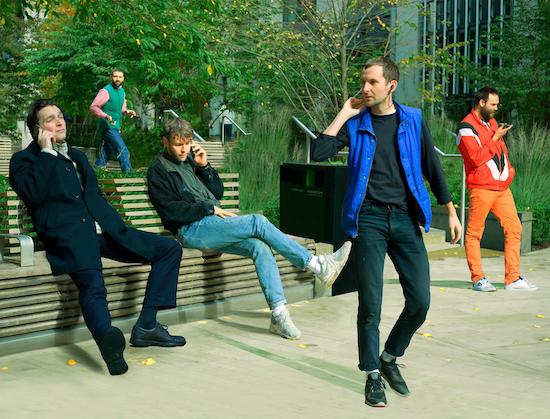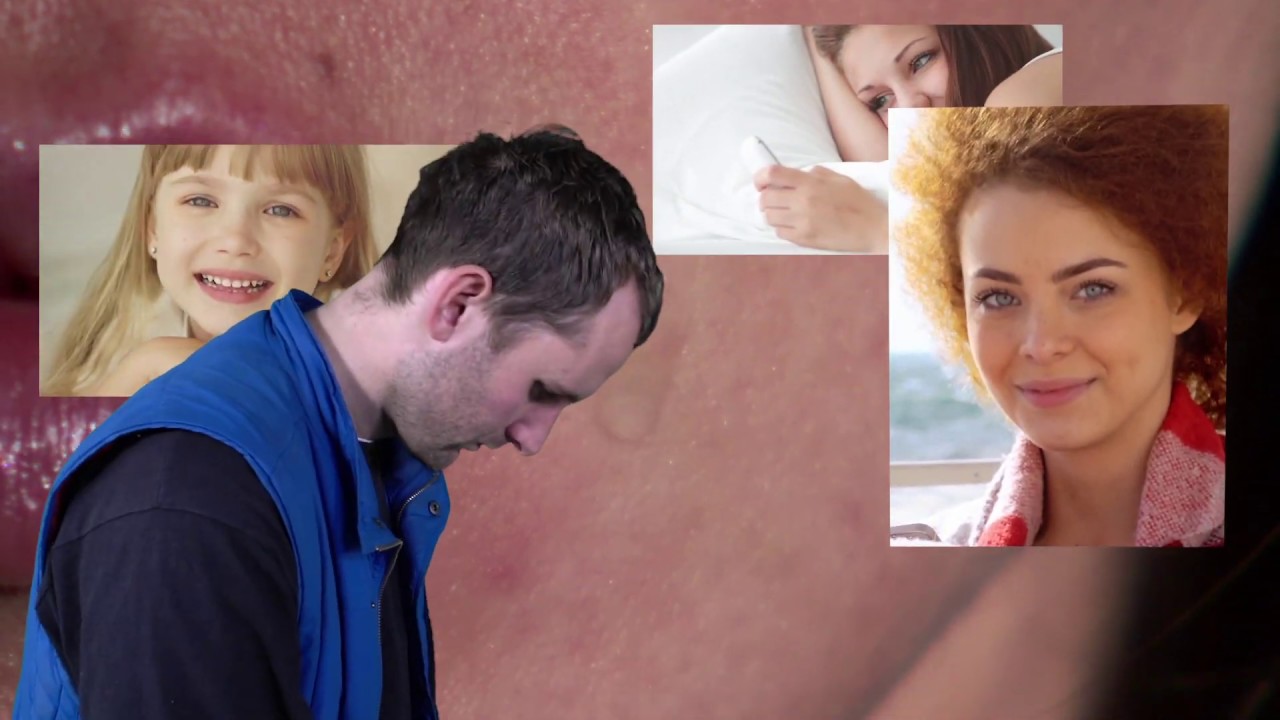Housewives portrait by Tom Glencross
“I mean, where do you start?”
Considering they’re a group that have done little, if any, press over the course of their prolific existence as boundary-pushing, genre-defying experimentalists, it should have been obvious that Housewives would be reluctant to discuss their past in too much detail. “Where do you start?” asks frontman Joseph Rafferty. “If we’re talking about the early days, this is going to be a long interview.” The implication here being that perhaps those early days are something not even worth discussing.
But still, a general sketch: the band are childhood friends from Gloucestershire who played music in various iterations as they grew up, eventually coming to London in 2009 and officially forming Housewives whilst living together. I clarify that I’m mainly asking as there’s so little information available – of course, all bands dread those stock interview questions (How did you meet? How did you get your name? What are your influences?), but in this instance, we kind of need some background, a bedrock – and I don’t want to give everything away. “Neither do we!” laughs bassist Sasha Evans. “Everything we’ve told you so far is what we’re willing to give away,” concurs Rafferty, nodding. Well, fair enough.
Sitting outside McGlynn’s Free House in Kings Cross, the original four members of Housewives – Joseph Rafferty, David Moran, Sasha Evans and Lawrence Dodd – um and er over inquiries about their initial formation. It’s not that they’ve got any big secrets to hide, or even that they’re trying to keep up an air of mystique – it seems it’s more that Housewives are a band who operate in the here-and-now, making art that reacts to their present environment first and foremost; Rafferty refers, at various points throughout our interview, to creations being “of their time”. Housewives have a fan in Charles Hayward of TINTH and Camberwell Now, and it’s easy to see how the philosophy of This Heat’s music influences their approach – a relentless desire to move forward, a reluctance to look back. Indeed, Housewives seem far more keen to discuss their latest piece of work, the upcoming Twilight Splendour – but more on this later.
Released in 2015, their self-titled debut Work was described in a tQ review by Simon Jay Catling as a “dark release, a modern type of of psychedelia for late-stage capitalism world that pushes the minds and bodies of its participants even further into chaos.” The album was recorded in a remote farm in the French countryside, “out-of society”, in Evans’ words. It’s a claustrophobic, intense listen, a product of its environment. “It was beautiful weather but we were locked away inside a massive barn for maybe 11-12 hours of the day, just sort of tinkering… we had so much time there.” How much time did they have? “We were there for a week.” The table explodes in uproarious laughter – another common occurrence throughout our interview. It’s obvious that Housewives are a close-knit group; dark, experimental music like theirs often invites a kind of self-seriousness or surliness, but there’s none of that to be found here. “That is a long time to spend with your best friends, all the time.” clarifies Rafferty.
Also with us is (relatively) recent addition, fifth member Ben Vince, who made his first appearance on the band’s 2017 live album FF061116. An established musical force in his own right, Vince is a prolific, virtuosic saxophonist who has collaborated with the likes of Joy Orbison, Mica Levi, Coby Sey and many, many others. Performing with Housewives, he’s euphoria incarnate, bouncing around the stage, beating his chest, swinging his arms, roaring as though his human body is barely capable of containing some extraterrestrial energy within. In person however, he exudes a sagely, almost meditative calm. “I mean I just have more time to dance. All these hands…” he gestures to the rest of the band. “They’re doing stuff all the time. I was a huge fan before, so it’s kind of what the music feels like to me. You have to give the most energy you can, and [Housewives] was the first vessel for me to play off something I wasn’t the brain of.”
Vince joined Housewives after finding that they lived on the same road in south London. “My flatmate Rob said he knew some people two doors down, then the wormhole kind of opened…”
“Is that what you call me?” quips Evans.
“But Ben isn’t just a ‘new member’,” says Rafferty. “He changes the dynamic between us… as a performer, his skill… it’s massive to have someone who can play so well just off the cuff, which is something we’d never valued before. I definitely never valued it on my own playing. None of us went to music school and learnt how to play properly or anything.”
On their upcoming second LP, Twilight Splendour, Housewives make a departure from the sonics of their previous releases, discarding guitars (for the most part) and descending into a throbbing digital hellscape. This is less a conscious effort to change, more a manifestation of the aforementioned forward motion, a reaction to environment, and a need to have more control over sound itself. On Work, the band would settle for things not sounding exactly how they wanted due to a performance-based way of writing, a more “organic construction” in drummer Dodd’s words. “We were adding layers in quite a physical and immediate way.”
“That’s just not what we’re doing anymore.” says Rafferty. “We’re not making that allowance. In France, we were working with [producer] Alex Bate who showed us a lot of interesting things in terms of production, capturing sound and playing it back. This time I wanted to learn how to do every part of the process, from coming up with an idea to having it presentable.”
“We’re always trying to do something new and interesting, and that became very difficult with guitars.” says Moran, for whom the instrument represented “one thing, always the same type of people playing the same type of music.” The absence of guitars wasn’t “out of principle”, however, says Rafferty “No, you just use the tools that are right for the job. Guitars didn’t seem to be a good tool for expressing complex emotions and ideas.”
Vince concurs. “On a semiotic level, the sound has changed a lot, [for example] the juxtaposition of the human voice and the digital voice to represent digital relationships. Things like autotune and voice pads are prevalent on the album. You can have a quasi-human digitised choir that has a very specific atmosphere. It’s jarring, and it’s not an easy listen from start to finish.”
“It’s contrary to itself, I guess.” says Rafferty. “Songs might be dark and uplifting at the same time, but that’s because they’re honest, or at least trying to be honest, so they’re complex. We’re open to complex themes, complex attitudes. Nothing is ever just one thing.” Indeed, music like Housewives’, music that is often described as unsettling or abrasive, can often simultaneously harbour a euphoric quality.
Confusion and juxtaposition are at the heart of what Housewives do. “Modernity is chaotic and complex. There’s no easy way to engage with these things, it feels like the only way to respond is in complicated and nuanced ways and forms.” says Evans. On Twilight Splendour, the band grapple with new developments in technology, presentient AI, algorithmic relationships and a desperate need to communicate, to connect. It’s fitting, then, that the album was written mostly in public spaces: cafes, pubs, a stark contrast to the way in which their debut was crafted – or then again, maybe not? “Thinking about it, they’re not completely different.” muses Rafferty. “[Twilight Splendour] was written in a totally isolated way as well, even though it was in the public realm. I was observing people, normal interactions and transactions.”
Despite being in London, the big city, surrounded by people and culture, the band still feel disconnected. “It feels like we’re actually completely separate,” says Rafferty. “That’s the nature of how so many people in this city are.” Rafferty speaks of “technological substitutes” for “missing links” in human relationships, and how any type of collectivism seems “at an absolute minimum. I would say I rarely come into contact with that idea. It sort of seems like interactions are based on that notion of being separate, of being individual.”
“There’s less shared experience in the physical realm.” says Vince. “Whilst there’s a proliferation of social interactions online.”
“That’s the thing, there’s technically more than ever now, but in a sense there’s less.” says Evans.
Does the internet and the abundance perhaps cheapen these interactions? “Well, it’s just a relationship isn’t it? You represent yourself in a certain way in real life, and you did it another way through your online ‘self’. I’m not necessarily saying one is worse than another, it’s just that people act differently on both. We’re kind of looking at a duality – duality in ourselves, other people, ideas, emotions. There’s constantly a juxtaposition.” says Rafferty.
“People have always performed different expressions of themselves.” says Evans. “People did that before social media, but I think nowadays there’s more tension because there are more elaborate ways it can be achieved and micromanaged. There are these hyperreal versions of yourself everywhere.”
This idea is reflected not just in Housewives’ music, but in their visual output as well. For example, the music video for single ‘SmttnKttns’ that sees the band performing as a collage of eerie corporate stock footage floats around them. “That video might seem uncanny and weird, but it’s all really fucking normal.” says Rafferty. “It’s so strange because these things are actually happening! This stuff has been produced to be financially viable. Like ‘couple taking a selfie on a bridge’. Somebody filmed that thinking it was a good way of making money, an image to sell. I like this idea that people are trying to sum up emotions in 30 seconds. You can search ‘happy’ and choose happy video to make a happy music video for a happy song. I like there being these little windows into different ideas of what normal life should be.”
Their press shot communicates this idea too – the band are all posed in front of what looks to be a swanky new residential development; they could almost be estate agents in this picture, but there’s still that cut-and-paste look that doesn’t feel quite right. “You’ve hit the nail on the head.” laughs Evans at the suggestion. “It’s kind of tense, because it doesn’t really line up.”
“All the visual ideas were developed in conjunction with writing the album. So it’s a similar process, using what we can find in the digital world and playing with that uncanny element of what reality is like now, a confusion between these two worlds we’re trying to live in.” says Moran.
Housewives are aware of the way society is developing, but rather than shy away from or even protest these changes, they engage with them, acknowledging their own place in the modern maelstrom. “We all live that duality. We are a version of ourselves in [‘SmttnKttns’ music video] just like anyone else [from the stock footage] is a version of themselves.” says Rafferty.
“We’re just trying to find closure”, says Evans. “I’m not saying that the music provides closure to me necessarily, but it definitely probes these things, and maybe people that listen to it might feel [that].”
“It definitely gives me closure”, counters Rafferty. “I think that’s the whole point of it. Creating a body of work you’re happy with and putting it out there.”
“I don’t think it gives full closure. For me it’s not like, oh, that’s that sorted then! I get it now!” says Evans.
“Oh yeah, maybe it’s more respite. I’m not cured!” laughs Rafferty.
“Yeah, our music provides respite, take this dose for a few weeks, see how you feel”, says Evans, leaning into my iPhone mic. “It’s not going to kill you!”
Twilight Splendour is out 27 March on Blank Editions. You can pre-order the album here




